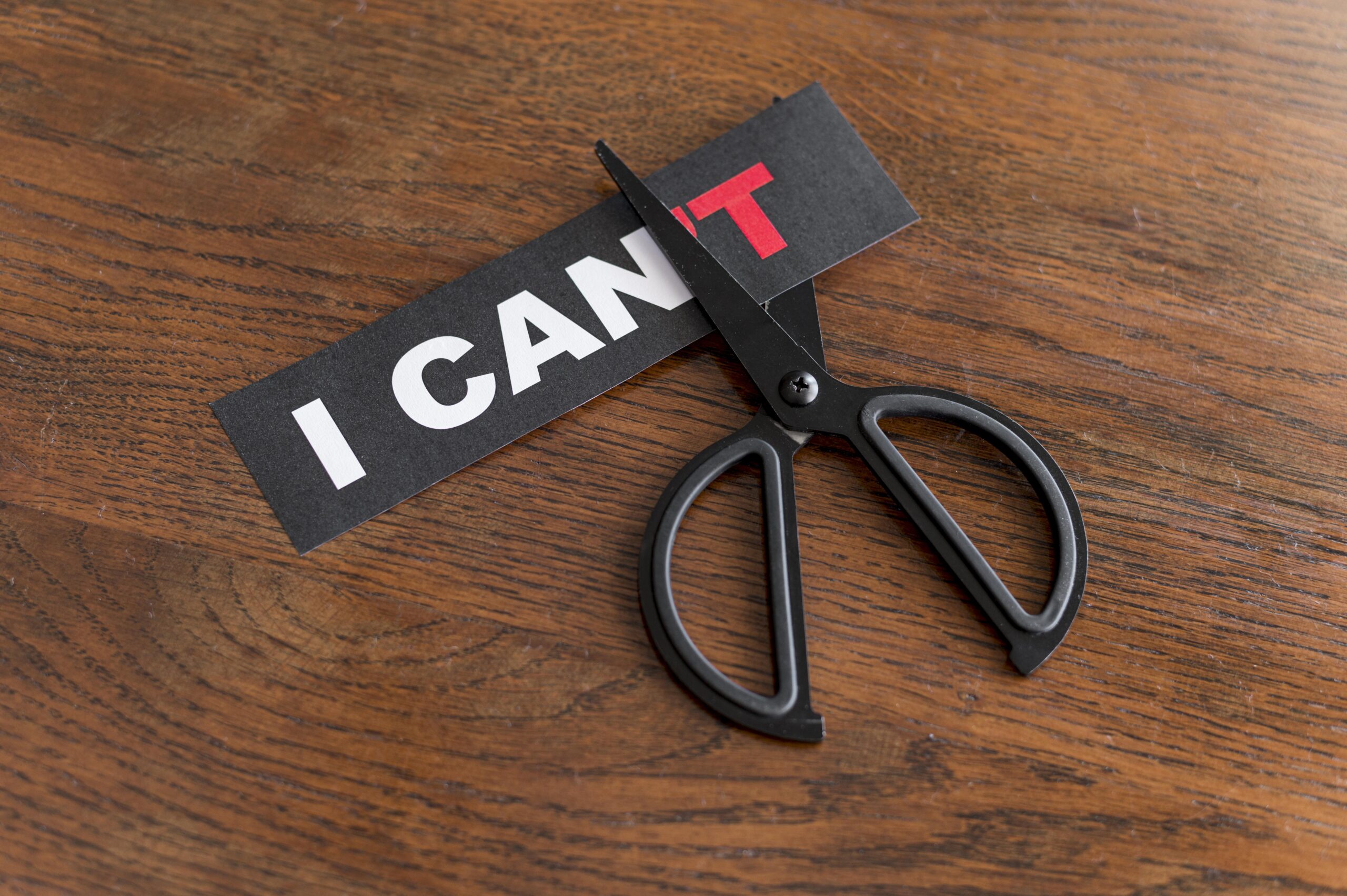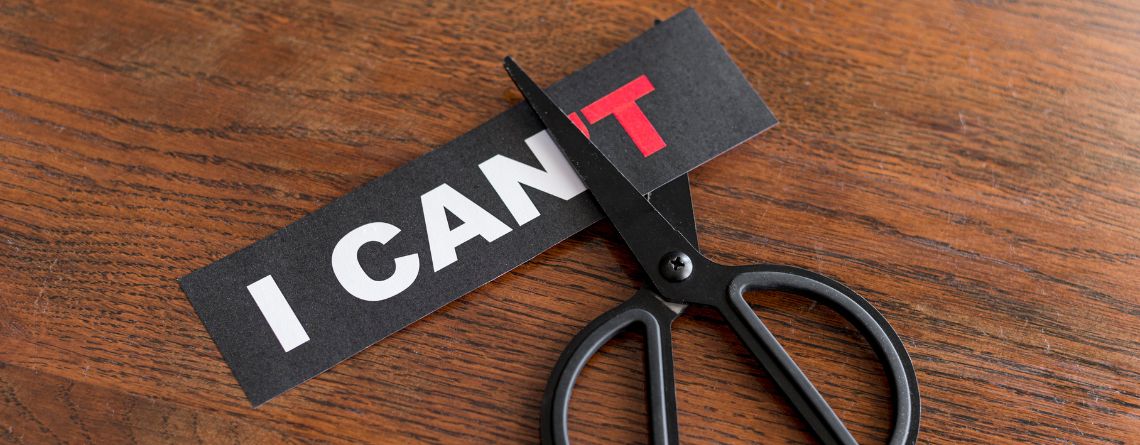From Doubt to Destiny: Overcoming Limiting Beliefs for Success
In the pursuit of success, there often exists an unseen barrier that holds us back—the barrier of limiting beliefs. These are the ingrained thoughts and perceptions that whisper doubt into our minds, convincing us that we are not capable or worthy of achieving our dreams. Yet, breaking free from these constraints is not only possible but imperative for realizing our full potential.
What are Limiting Beliefs?

Limiting beliefs are the subconscious convictions we hold about ourselves, others, and the world around us that inhibit our growth and hinder our progress. They can take various forms, from beliefs about our abilities and worthiness to beliefs about what is possible or impossible for us to achieve. Often formed early in life through experiences, upbringing, or societal influences, they act as mental roadblocks, preventing us from living our best lives.
The significance of overcoming limiting beliefs cannot be overstated. These beliefs have the power to shape our reality, influencing our thoughts, emotions, and actions in profound ways. When we allow them to go unchallenged, they create a self-imposed glass ceiling, limiting our potential and keeping us stuck in a cycle of self-doubt and fear. However, by confronting and dismantling these beliefs, we can pave the way for growth, resilience, and ultimately, success.
Why Must They Be Overcome?
The significance of overcoming limiting beliefs cannot be overstated. These beliefs have the power to shape our reality, influencing our thoughts, emotions, and actions in profound ways. When we allow limiting beliefs to go unchallenged, they create a self-imposed glass ceiling, limiting our potential and keeping us stuck in a cycle of self-doubt and fear. However, by confronting and dismantling these beliefs, we can pave the way for growth, resilience, and ultimately, success.
Understanding Limiting Beliefs
At their core, limiting beliefs are the silent saboteurs that lurk within the depths of our subconscious, shaping our perceptions, decisions, and actions in ways we may not even realize. These beliefs often stem from past experiences, childhood upbringing, societal conditioning, or even traumatic events, and they operate beneath the surface of our conscious awareness, shaping our thoughts, emotions, and behaviors. Examples of limiting beliefs may include “I’m not good enough,” “I don’t deserve success,” or “I’ll never be able to achieve my dreams.”
Common Types of Limiting Beliefs
Limiting beliefs can manifest in a myriad of ways. Some common types include:
- Self-doubt: Beliefs that undermine our confidence and self-worth.
- Fear of failure: Beliefs that prevent us from taking risks or pursuing our goals.
- Perfectionism: Beliefs that demand flawlessness and breed feelings of inadequacy.
- Scarcity mindset: Beliefs that perpetuate feelings of lack and limitation.
- Imposter syndrome: Beliefs that discount our achievements and attribute success to luck or deception.
How Limiting Beliefs Manifest in Daily Life
Such beliefs infiltrate every aspect of our lives, subtly shaping our thoughts, attitudes, and behaviors in ways that hold us back from reaching our full potential. They may manifest as self-sabotaging behaviors, negative self-talk, avoidance of challenges, or a reluctance to step outside of our comfort zones. In our interactions with others, they can manifest as self-imposed limitations on relationships, career opportunities, or personal growth experiences.
Identifying Your Limiting Beliefs
Let’s explore a few strategies and techniques for identifying limiting beliefs.
A. Self-Reflection Exercises
Self-reflection is a powerful tool for uncovering the hidden beliefs that shape our thoughts and behaviors. By taking the time to introspect and examine our inner dialogue, we can begin to identify patterns of thought that may be rooted in limiting beliefs. Journaling, meditation, and mindfulness practices can all be valuable tools for deepening our self-awareness and gaining insight into the beliefs that underpin our worldview.
B. Recognizing Patterns and Triggers
Limiting beliefs often reveal themselves through recurring patterns of behavior or emotional reactions. Pay attention to situations or circumstances that trigger feelings of fear, self-doubt, or inadequacy. These can serve as clues pointing towards any particular underlying beliefs that are holding you back.
C. Seeking Feedback from Others
Sometimes, we are too close to our own thoughts and experiences to see them clearly. Seeking feedback from trusted friends, family members, or mentors can provide valuable perspective and insight into our blind spots. Ask others to share their observations about your behaviors, attitudes, and beliefs, and be open to receiving constructive criticism. Their input can offer a fresh perspective and help illuminate aspects of yourself that may have been hidden from view.
D. Tools for Uncovering Deeply Rooted Beliefs
Uncovering such beliefs requires a willingness to dig deep and explore the subconscious terrain of our minds. Various therapeutic modalities, such as cognitive-behavioral therapy (CBT), neuro-linguistic programming (NLP), or inner child work, can be powerful tools for uncovering and addressing deeply ingrained beliefs. Working with a qualified therapist or coach can provide support and guidance as you navigate this process of self-discovery and transformation.
Challenging and Reframing Limiting Beliefs

In our journey to overcome limiting beliefs, how can we actively challenge and reframe the negative narratives that hold us back?
A. Questioning their Validity
The first step in challenging limiting beliefs is to question their validity. Often, these beliefs are based on flawed assumptions, distorted perceptions, or outdated experiences. By critically examining the evidence supporting these beliefs, we can begin to dismantle their hold on us. Ask yourself:
- What evidence do I have to support this belief?
- Is this belief based on facts or assumptions?
- Are there alternative interpretations or explanations?
- How would my life be different if I didn’t hold onto this belief?
B. Cognitive Restructuring Techniques
Cognitive restructuring involves identifying and reframing negative thought patterns associated with limiting beliefs. This technique helps us replace irrational or unhelpful thoughts with more balanced and realistic ones. Some of these techniques include:
- Thought challenging: Analyze the evidence for and against your limiting beliefs and develop more balanced perspectives.
- Cognitive reframing: Replace negative thoughts with positive or neutral alternatives.
- Decatastrophizing: Challenge catastrophic thinking by considering more realistic outcomes and solutions.
- Perspective-taking: Consider alternative viewpoints or imagine how someone else might interpret the situation.
C. Cultivating a Growth Mindset
A growth mindset is essential for overcoming limiting beliefs and achieving personal growth. This mindset, coined by psychologist Carol Dweck, emphasizes the belief that abilities and intelligence can be developed through dedication and effort. By adopting a growth mindset, we embrace challenges, learn from failures, and persist in the face of setbacks. Cultivate a growth mindset by:
- Embracing challenges as opportunities for growth and learning.
- Viewing failures as temporary setbacks and valuable learning experiences.
- Celebrating effort and progress, rather than focusing solely on outcomes.
- Seeking out feedback and constructive criticism to facilitate growth and improvement.
D. Affirmations and Positive Self-Talk
Affirmations and positive self-talk are powerful tools for reshaping our beliefs and attitudes. By consciously reinforcing positive statements and beliefs, we can counteract the negativity and self-doubt associated with these beliefs. We can incorporate such affirmations and self-talk into our daily routine by:
- Identifying positive affirmations that counteract your limiting beliefs (e.g., “I am capable and worthy of success”).
- Repeating affirmations regularly, preferably in front of a mirror or as part of a daily meditation practice.
- Using positive self-talk to challenge negative thoughts and replace them with more empowering alternatives.
- Surrounding yourself with supportive people who reinforce positive beliefs and encourage your personal growth.
Strategies for Overcoming Limiting Beliefs

A. Setting Realistic Goals and Milestones
Setting realistic goals and milestones is one such effective strategy. By breaking down larger goals into smaller, achievable tasks, individuals can build momentum, gain confidence, and gradually expand their comfort zones.
When setting goals:
- Ensure they are specific, measurable, attainable, relevant, and time-bound (SMART).
- Start with small, manageable goals and gradually increase the difficulty as confidence grows.
- Celebrate progress and acknowledge achievements along the way to maintain motivation and momentum.
- Adjust goals and milestones as needed based on feedback and changing circumstances.
B. Stepping Out of Comfort Zones
Growth and transformation occur outside of our comfort zones, where we confront fear, uncertainty, and resistance head-on. To expand your comfort zone:
- Identify areas where limiting beliefs are holding you back and commit to facing them head-on.
- Start with small, manageable challenges and gradually increase the difficulty as you build confidence.
- Embrace discomfort as a sign of growth and progress, rather than a threat or barrier.
- Seek support from mentors, coaches, or accountability partners to provide guidance and encouragement as you step outside of your comfort zone.
C. Visualization and Mental Rehearsal
These are two powerful techniques for overcoming beliefs and manifesting success. By vividly imagining yourself overcoming obstacles and achieving your goals, you can reprogram your subconscious mind and reinforce positive beliefs and attitudes. To harness the power of visualization:
- Set aside time each day to visualize yourself achieving your goals and overcoming obstacles.
- Engage all of your senses to make the visualization as vivid and realistic as possible.
- Focus on the emotions and sensations associated with success, allowing yourself to experience them fully.
- Use mental rehearsal to prepare for challenging situations and build confidence in your ability to handle them effectively.
D. Building a Support Network
Building a support network is also crucial for overcoming limiting beliefs and maintaining motivation and accountability. Surrounding yourself with positive, supportive individuals who believe in your potential can provide encouragement, perspective, and valuable feedback as you work towards your goals. To build a support network:
- Identify individuals who share your values, goals, and aspirations, and cultivate meaningful relationships with them.
- Seek out mentors, coaches, or accountability partners who can provide guidance, support, and constructive feedback.
- Participate in networking events, workshops, or online communities to connect with like-minded individuals and expand your support network.
- Be proactive in seeking support and offering support to others, creating a mutually beneficial relationship built on trust, respect, and mutual encouragement.
Action Plan for Success
Now let’s outline a comprehensive action plan that can help us break free from the constraints of our limiting beliefs:
A. Creating a Roadmap for Personal Development
The first step is to create a roadmap for personal development. This involves identifying specific goals, outlining actionable steps, and establishing a timeline for achievement. To create your roadmap:
- Reflect on your long-term vision and identify the goals that align with your values and aspirations.
- Break down each goal into smaller, manageable tasks or milestones that can be achieved incrementally.
- Prioritize tasks based on urgency, importance, and feasibility, and assign deadlines to keep yourself accountable.
- Consider potential obstacles or challenges that may arise and develop contingency plans to address them proactively.
- Regularly review and adjust your roadmap as needed to accommodate changes in circumstances or priorities.
B. Implementing Daily Practices to Reinforce Positive Beliefs
Consistency is key when it comes to overcoming limiting beliefs and reinforcing positive beliefs. Implementing daily practices that align with your goals and values can help solidify new habits and perspectives over time. Consider incorporating the following practices into your daily routine:
- Morning affirmations: Start each day with positive affirmations that reinforce your belief in your abilities and potential for success.
- Visualization exercises: Dedicate time each day to visualize yourself achieving your goals and embodying the qualities and characteristics of your ideal self.
- Gratitude journaling: Reflect on the things you’re grateful for each day, focusing on the positive aspects of your life and experiences.
- Self-care activities: Prioritize self-care activities that nourish your mind, body, and spirit, such as exercise, meditation, or spending time in nature.
C. Monitoring Progress and Celebrating Successes
Tracking your progress and celebrating successes along the way is essential for maintaining motivation and momentum on your journey to success. Set aside time regularly to monitor your progress, assess your achievements, and celebrate milestones. Consider the following strategies:
- Keep a journal or progress tracker to record your accomplishments, setbacks, and lessons learned.
- Schedule regular checkpoints to review your progress and adjust your action plan as needed.
- Celebrate both small and large victories to acknowledge your hard work and perseverance.
- Share your successes with friends, family, or your support network to amplify the sense of accomplishment and reinforce positive beliefs.
D. Adjusting Strategies as Needed
Flexibility and adaptability are crucial qualities when it comes to achieving success and overcoming obstacles. Be prepared to adjust your strategies and approach as needed based on feedback, changing circumstances, or new insights. Consider the following principles:
- Be open to feedback and constructive criticism from mentors, peers, or trusted advisors.
- Stay attuned to changes in your environment or circumstances that may require a shift in your approach or priorities.
- Embrace failure as an opportunity for growth and learning, rather than a setback or defeat.
- Trust your intuition and be willing to take calculated risks in pursuit of your goals and aspirations.
The Big Takeaway
In the pursuit of success, our greatest obstacles often lie within ourselves. By conquering our limiting beliefs, we unlock the door to unlimited potential and possibilities. Success is not determined by external circumstances or innate abilities but by our mindset, resilience, and willingness to challenge the status quo.
As you navigate the ups and downs of your journey, remember that every setback is an opportunity for growth, every failure is a stepping stone to success, and every limiting belief you conquer brings you one step closer to achieving your goals and aspirations.
Remember, the power to transform your reality literally lies within you. Seize it with courage, determination, and unwavering belief in your ability to overcome any obstacle and achieve greatness. The journey will be challenging, but the rewards are immeasurable.
This article is authored by Clive Coutinho
(A version of this piece first appeared in ItsGoa magazine. )
About Clive
As an Integrative, Life, and Personal Coach, Clive conducts himself like a skilled navigator, guiding individuals through the choppy waters of personal growth and self-discovery. Possessing an innate ability to listen with empathy, and understand deeply, he blends wisdom and encouragement to empower others to navigate life’s challenges, foster resilience, and self-awareness, offering insights and illuminating paths to success and fulfillment.
As a beacon of inspiration and accountability, rather than just showing the way, he strongly believes in walking alongside his clients, championing every step of their journey toward their triumph and success.
Need personalized guidance to become the most authentic you? Book your one-on-one consult with Clive by calling 1800 102 0253 write to us at consults@lukecoutinho.com.
|
From a pimple to cancer, our You Care Wellness Program helps you find a way Talk to our integrative team of experts today 18001020253 |










Leave a Reply